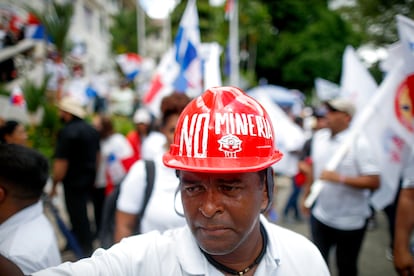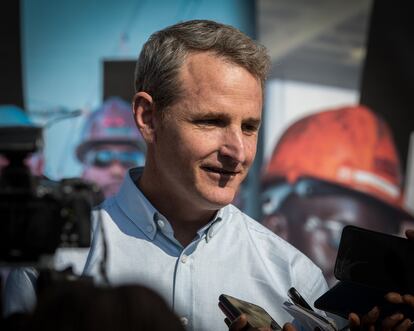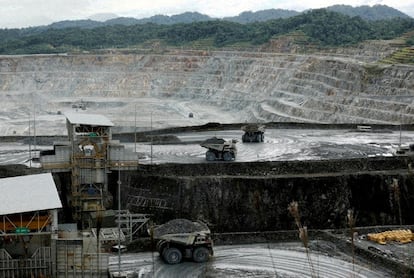CEO of First Quantum Minerals: ‘We want to be part of the solution around what happens now in Panama and the mine’
After its contract in Panama was cancelled, Tristan Pascall, the head of Minera Panamá, a subsidiary of the Canadian company, is urging authorities to allow them to continue operating the copper mine to close it ‘responsibly’

Having found itself in the middle of an historic uprising in Panama, Canadian mining company First Quantum Minerals is packing its bags and getting ready to make its exit. The operator of the largest copper mine in Central America since the 1950s, it received an extension of its license for up to 40 more years. This unleashed the fury of thousands of citizens, who demanded that the country should comply with its moratorium on open pit mining. Massive protests paralyzed Panama for more than a month, reaching a scale not seen since the military dictatorship in the late 1980s. This week, after a Supreme Court ruling declared the contract unconstitutional, President Laurentino Cortizo put an end to First Quantum’s operations. By all accounts, the company lost this battle.
What remains to be done now is to close the mine “responsibly,” said the CEO of First Quantum, Tristan Pascall, in an interview with EL PAÍS. The mine supplies the world with 1% of its copper. Some 7,000 employees will lose their jobs and more than 30,000 people who indirectly benefited from the mine’s activity will be affected. “We recognize that we need to do things better in terms of the way we communicate things”, Pascall said. “We need to be listening and learning from this.” With the electrification of technologies, promoted as a transition to replace fossil fuels, demand for copper globally will rise. Against this backdrop, it is likely that citizens around the world will resist like many Panamanians did and companies will have to find a way to operate without affecting the environment, the executive says.
Question. This contract was already ruled unconstitutional in 2017. Why did First Quantum insist on extending a contract in a country with a moratorium on open pit mining?
Answer. The history that got us here is that the original deposit was found in 1958. It has taken a long time to develop, and one of the key milestones was in 1997 when we reached an agreement to develop the mine. It still took another 20 years or so to get into commercial production, and First Quantum came in in 2013 to develop the mine after getting approval on the Environmental Social Impact Assessment. The contract was extended in 2017 by the Ministry of Commerce. And yes, there were cases in front of the Supreme Court, and they ruled to say that the contract was unconstitutional. But at that time, the government of Panama made assertions that the contract remained valid and continued to encourage the investment in the mine. So, we did. We invested $10 billion to date. We continued to employ people, 90% of which are Panamanian. It’s a real success story. Since the 2017 decision, it’s been a process to engage and negotiate an outcome around that unconstitutionality ruling, which brings us to the current period. It’s taken two years of detailed negotiation with the current administration, a lot of effort, due process, public consultation before it was sent by the regulators to Congress, and it was there where things turned. We were surprised by how quickly it was approved and signed into law. That was when we noticed quite a change in the mood in the country. I think it surprised many Panamanians, although it had taken five years and two years of detailed negotiations. We acknowledge the surprise around that, which led to the outpouring of public protest not only focused on mining, but more broadly in the run-up to the election next year in May. We’ve had 25 years of conditions that have advanced development and now a Supreme Court’s decision has made it unconstitutional, and we cannot proceed. We want to be part of the solution around what happens now in Panama and what happens on the mine. We want to build an open and honest dialogue around it and, and where to go from here.

Q. The company said recently that it is not viable to bring in a partner to keep operations going. What happens now?
A. Our priority is the welfare and well-being of our workforce, and now we must start a process with the Labor Ministry. There’s 7,000 people who are now in jeopardy and 33,000 indirectly affected. Next is the environmental side. We understand the environmental concerns around the mine. We’re responsible for clearing 3,000 hectares for the development of the mine, which is less than 0.1% of the land mass, but it returns a lot in terms of GDP. The issue now is that if we can’t operate the mine, if we can’t be present on the mine, we’ll see some deterioration in the environment quite quickly. Because of the sulfide material that we produce, we’ll see the pH drop in the water to become acidic within weeks. That will trigger some downstream effects in terms of aquatic conditions, for fish and into the rivers and so on. That’s the concern. We have a mutual obligation to ensure that environmental conditions are resolved.
Q. Experts point out that what happened in Panama could happen elsewhere, as we see a rise in copper demand driven by a transition away from fossil fuels and towards electrification. What is your outlook?
A. It’s a challenge for the whole industry and I think for the world as well. If we just stay on the course outlined by the COP28, we’ll need at least another 6 million tons of copper by the end of the 2030 decade. As I sit here, that’s not going to happen. To build a new copper mine in the world takes 16 years from new discovery. We’re not finding the resources that we need and the geopolitical conditions, the requirements from different countries and taxation continues to raise the standards. Interest rates keep increasing the costs of building a new project and I think it’s correct that environmental standards, community standards, requirements of trust in the industry are heightened. Certainly, Cobre Panamá is a mine that was right at the highest level of those, and we need to do a better job in communicating all that we do there.

Q. Canadian mining companies have a bad reputation in this region and part of that comes from the perception that this industry exploits resources in countries in the so-called Global South, while preserving resources in rich, developed countries. What is your view on this?
A. I think the industry has been rightfully seen as a global polluter in the past, but that’s changing. First Quantum is the most electrified, certainly in the copper mining industry, in terms of the transition away from burning. We will have the first battery truck used on a copper mine running in Zambia early in the new year, and that marks a transition. We put overhead trolley lines that run on electricity. We produce the copper that goes into renewable energy. In terms of the Canadian angle, our company was built up from the ground. I spent eight years working in Zambia. Really, our operations are on the ground in terms of the communities. We understand well that communities around our operations hold the future and the sustainability of mining, that you cannot work without the accord of the people around you. We have a good basis to do that in the countries we operate like Mauritania and Turkey, but we also have mines in Spain, Finland, and Australia. We operate in first world jurisdictions as well, and the same rules apply.
Sign up for our weekly newsletter to get more English-language news coverage from EL PAÍS USA Edition
Tu suscripción se está usando en otro dispositivo
¿Quieres añadir otro usuario a tu suscripción?
Si continúas leyendo en este dispositivo, no se podrá leer en el otro.
FlechaTu suscripción se está usando en otro dispositivo y solo puedes acceder a EL PAÍS desde un dispositivo a la vez.
Si quieres compartir tu cuenta, cambia tu suscripción a la modalidad Premium, así podrás añadir otro usuario. Cada uno accederá con su propia cuenta de email, lo que os permitirá personalizar vuestra experiencia en EL PAÍS.
¿Tienes una suscripción de empresa? Accede aquí para contratar más cuentas.
En el caso de no saber quién está usando tu cuenta, te recomendamos cambiar tu contraseña aquí.
Si decides continuar compartiendo tu cuenta, este mensaje se mostrará en tu dispositivo y en el de la otra persona que está usando tu cuenta de forma indefinida, afectando a tu experiencia de lectura. Puedes consultar aquí los términos y condiciones de la suscripción digital.









































